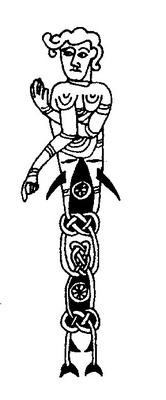Freighting the Whale IV: Interlude

image from the Book of Kells
The gods are so "original" that a new world is always born with a new god -- a new speech or new aspect of the world. They are "there" not only in the beginning when they themselves originated, and not only in the periodic repetitions of that first organization, ie cosmic reappearances and representations on festal occasions. Though they are present all the time, the mythologems which unfold in narrative form what is contained in the figures of the gods are always set in primordialtime. The return to the origins and to primordality is a basic feature of every mythology.
- Carl Kerenyi, "Prologomena" to Essays on a Science of Mythology
***
Brendan and his monks find the head of a dead man by the seashore. The head is very large, its forehead measuring five feet across. At Brendan's request, the giant tells him that he was a heathen, who for his own profit waded through the sea. He was big and strong, and stood a hundred feet tall. He waylaid sailors and took their goods. For all his outsize proportions he was drowned in a flood. Brendan offers to resuscitate and baptize him, so as to give him the possibility of obtaining remission for his sins and afterwards going to paradise. The giant refuses because he is afraid he will not be able to resist the temptation of sin. This would be worse, for, as he says, baptized souls are tormented much worse in hell than heathens are. Besides, he has a terrible fear of dying once again. He wants to go back to his torments in the darkness. He takes his leave, with Brendan's good wishes. Brendan departs in his ship.
- from Clara Strijbosch, The Heathen Giant in The Voyage of St. Brendan
***
The Life of Colum Cille (Columba), written in Irish by Manus O'Donnell in 1532, contains the following episode:
"Once when Colum Cille was walking beside the river Boyne a human skull was brought to him. The size of the skull was much bigger than the skulls of the people of that time. Then his followers said to Colum Cille, "It is a pity we don't know whose skull this is, or the whereabouts of the soul that was in the body on which it was." Colum Cille answered, "I'm not leaving this place until I find this out from God for you."
"Then Colum Cille prayed earnestly to God for that to be revealed to him, and God heard that prayer so that the skull itself spoke to him. It said that it was the skull of Cormac mac Airt, son of Conn of the Hundred Battles, king of Ireland, and an ancestor to himself, for Colum Cille was tenth generation after Cormac. And the skull said that although his faith wasn't perfect, he had a certain amount of faith and, because of his keeping the truth and that as God knew that from his descendants would come Colum Cille who would pray for his soul, He had not damned him permanently, although it was in severe pain that he awaited these prayers.
"Then Colum Cillle picked up the skull and washed it honorably, and baptized and blessed it; then he buried it. And Colum Cille did not leave that place until he had said 30 masses for the soul of Cormac. And at the last of the masses, the angels of God appeared to Colum Cille, taking Cormac's soul with them to enjoy eternal glory through the prayers of Colum Cille."

<< Home